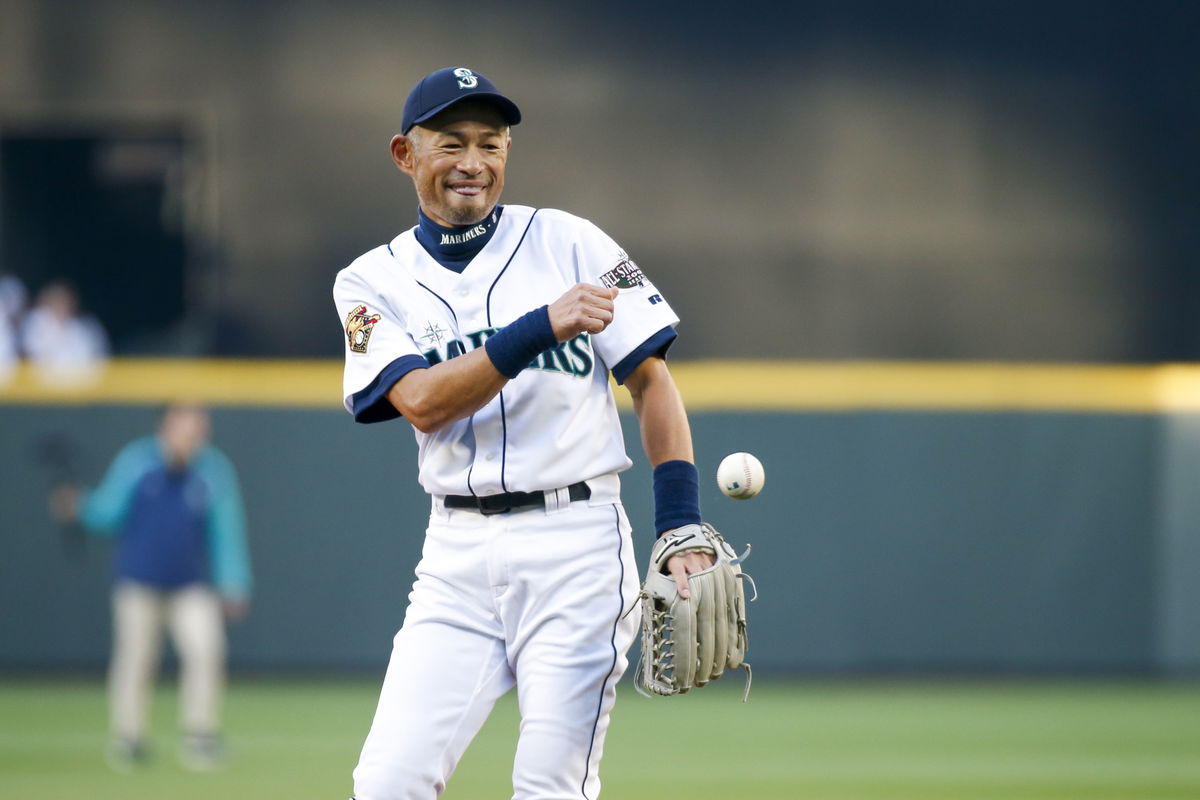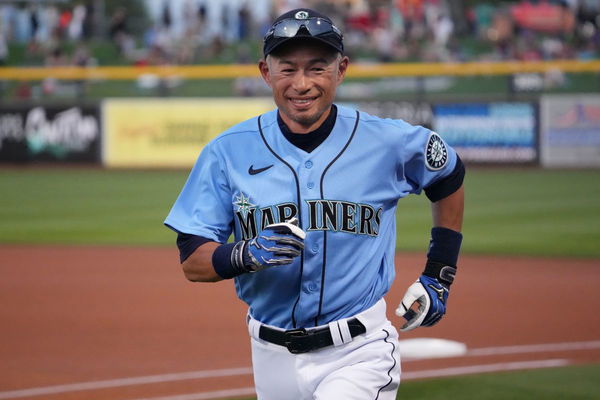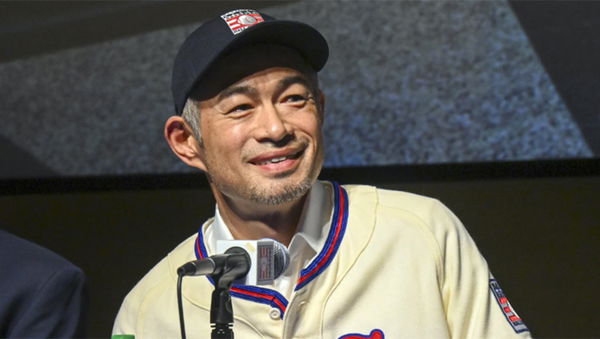
USA Today via Reuters
Apr 15, 2022; Seattle, Washington, USA; Seattle Mariners former outfielder Ichiro Suzuki tosses a ball to the dugout before throwing out the first pitch for a game against the Houston Astros at T-Mobile Park. Mandatory Credit: Joe Nicholson-USA TODAY Sports

USA Today via Reuters
Apr 15, 2022; Seattle, Washington, USA; Seattle Mariners former outfielder Ichiro Suzuki tosses a ball to the dugout before throwing out the first pitch for a game against the Houston Astros at T-Mobile Park. Mandatory Credit: Joe Nicholson-USA TODAY Sports
Ichiro Suzuki’s election to the Baseball Hall of Fame in 2025 marks a historic milestone. He became the first Japanese-born player voted in via the BBWAA, earning 393 of 394 votes (99.7 %), just one shy of a unanimous selection. Beyond the ceremony on July 27, 2025, in Cooperstown, his legacy stands as a testament to the global reach of baseball and a career built on meticulous consistency. Long before this journey even began, a young Ishiro was inspired by his father to play.
Watch What’s Trending Now!
Ichiro’s story began long before Cooperstown. As a young boy in Japan, he fell in love with the game, inspired by his father and local coaches. His early passion would soon evolve into a disciplined work ethic and an unorthodox style that made him stand out. This led him to play for Japan’s Orix BlueWave, and then three MLB franchises. He not only broke cultural ground in the U.S., but also compiled jaw-dropping stats. He racked over 4,300 career hits, multiple batting titles, Gold Gloves, and more. Alongside his humble beginnings, it’s his later achievements that elevated him to superstar status and set the stage for his career milestones. After the Mariners came calling, his meteoric entry put him on the map.
What makes Ichiro Suzuki a superstar? An overview of his career
Early Mariners manager Joe Girardi recalled skepticism in Spring Training 2001. “They were saying … ‘Can he play?’ … People were like, ‘he’s little’”. With a steely grit, he burst onto the scene in his rookie year, batting .350 and delivering 242 hits. He led the American League in stolen bases to capture both Rookie of the Year and MVP in the same season. This was a rare double that echoed Fred Lynn’s 1975 feat. His performance electrified Seattle and set the tone for what fans and pundits soon recognized. Ichiro was no fluke, but a full-fledged superstar born in Japan, now breaking records in the U.S.

One of his signature breakout moments came when he set the MLB single‑season hits record with 262 in 2004. This has been a mark still unmatched. He impressed with extraordinary defensive plays in right field to his lightning‑quick bunt hits, and leadoff steals. Every aspect of his game stood out. It soon felt inevitable. His trajectory from Tokyo to baseball immortality was clear from the early innings of his debut major league career. The seeds of greatness were planted, and they sprouted fast. A Japanese teenager with an odd swing was becoming the most reliable contact hitter in MLB history. But the signs were always there, deeply rooted in his NPB foundation, where he had impressed many.
How Good Was His NPB Career? Know all about his stats, records, achievements, and more.
In Japan, Ichiro debuted with the Orix BlueWave in 1992. However, he didn’t become a full-time starter until 1994 under manager Akira Ōgi, who believed in his unique swing. His .385 average that season set a Pacific League record. He went on to win seven consecutive batting titles, three straight MVP awards, and collect Golden Gloves and stolen base titles along the way. As his NPB career progressed, he was accomplishing something new every day.
As his NPB career progressed, fans in Japan embraced him as a phenomenon. Every at‑bat scrutinized, every hit defended by dedicated supporters. Games where he had 200-plus hits, league-leading steals, and high fielding marks became routine. Mariners’ scouts, impressed by his contact skills, bat control, vision, and speed, saw not just a Japanese superstar. They saw a future MLB legend. Furthermore, Orix’s willingness to post him in 2000 opened the door for Seattle. They offered roughly $13 M to negotiate and eventually secure him. With 1,278 professional hits and a career batting average of .353 in Japan, Ichiro announced himself as a player on the verge of something even greater. This fact came full circle when the Mariners offered him the chance to play in MLB.
How did Ichiro Suzuki play in MLB? All about his stats, records, achievements, and more from the big league
Once Ichiro joined MLB in 2001, he wasted no time redefining expectations. Over 2,653 games, he tallied 3,089 hits, a .311 batting average, 509 stolen bases, 10 Gold Gloves, and 10 All-Star selections. He also tied the major-league single‑season hits record with a staggering 262 hits in 2004. He answered all early questions with a flourish, winning AL batting titles (including .372 in 2004, a Mariners team record) and helping Seattle to 116 wins in 2001, tying an MLB record at that time. Reflecting after his election, Ichiro even said, “As a baseball player, this is the highest honor that you can achieve”. Having achieved so much, he naturally went after every baseball player’s dream.

In 2012, he requested a trade to the New York Yankees, seeking a shot at a World Series. He provided solid performances (.281 AVG over three seasons), gritty veteran leadership, and that trademark speed and defense. Later, with the Miami Marlins (2015–17), he added a 509th stolen base and continued to show up at the plate. He returned to Seattle for a farewell in 2018–19, retiring at age 45. His combined career hits totalled 4,367, surpassing Pete Rose’s MLB record of 4,256. The Hall of Fame voters rewarded that consistency and career longevity in kind. Ichiro was elected first ballot in 2025 with a phenomenal 99.7 % support.
From his early days in Japan to his legendary MLB career, Ichiro Suzuki’s journey is one of passion, detail, and unmatched contact-hitting mastery. His election to the Hall of Fame wasn’t just about the statistics; it was about true passion and persistence. Ichiro’s story proves that greatness isn’t always loud. Sometimes, it’s consistent, disciplined, and built over a lifetime of precise swings, countless hits, and a singular love for the game that transcended borders.

